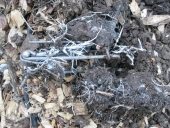
 1
1




“We can complain because rose bushes have thorns, or rejoice because thorn bushes have roses.” — Abraham Lincoln
 2
2




“The beautiful thing about learning is that nobody can take it away from you.” – B.B. King




“The beautiful thing about learning is that nobody can take it away from you.” – B.B. King
 1
1




Weeds are just plants with enough surplus will to live to withstand normal levels of gardening!--Alexandra Petri
 2
2




“We can complain because rose bushes have thorns, or rejoice because thorn bushes have roses.” — Abraham Lincoln
 2
2




“The beautiful thing about learning is that nobody can take it away from you.” – B.B. King
 2
2




Jen Fulkerson wrote: I actually had two tomato plants and 3 pepper plants that are still alive that I planted last spring. I don't know if they will produce, but I'm excited to find out. I know the very mild winter we had has a lot to do with it, but we have had mild winters before, and I have never had a warm weather plant live through the winter. Sorry for the long explanation.
“The beautiful thing about learning is that nobody can take it away from you.” – B.B. King

| I agree. Here's the link: http://stoves2.com |


